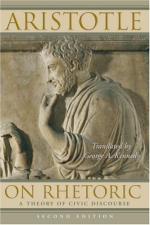
|
| Name: _________________________ | Period: ___________________ |
This quiz consists of 5 multiple choice and 5 short answer questions through Book II, Chapters 23-26.
Multiple Choice Questions
1. How did Aristotle explain the binding extent of contracts?
(a) They were not binding.
(b) Only between two individuals.
(c) Only between two individuals or the courts and an individual.
(d) Only between the courts and an individual.
2. How did Aristotle define a maxim?
(a) A long statement about impractical conduct.
(b) A short statement about practical conduct.
(c) A series of long statements about impractical conduct.
(d) A series of short statements about practical conduct.
3. What about the past did Aristotle say that a legal orator was concerned with proving?
(a) Facts.
(b) Actions.
(c) Doubts.
(d) Opinions.
4. From the information in Book II, Chapter 1, what should a speaker do in order to put the audience in a certain frame of mind?
(a) Challenge them.
(b) Manipulate their emotions.
(c) Ask them questions.
(d) Compliment them.
5. How did Aristotle think rhetoric could be useful in terms of one's beliefs?
(a) Refinement.
(b) Explanation.
(c) Expansion.
(d) Confirmation.
Short Answer Questions
1. What did Aristotle say was the chief concern of political rhetoric?
2. How many different subjects of political oratory did Aristotle discuss in Book I, Chapter 4?
3. What were three examples of the voluntary causes for human action listed by Aristotle?
4. Which of the following did Aristotle think were more likely to commit crimes?
5. Which view did Aristotle think people in their prime had of money?
|
This section contains 270 words (approx. 1 page at 300 words per page) |

|




